Five ways to counter ageism
By Ashton Applewhite •
Wondering where to start in challenging ageism? Internationally recognised expert Ashton Applewhite offers five ways to think differently and take that change out into the world.
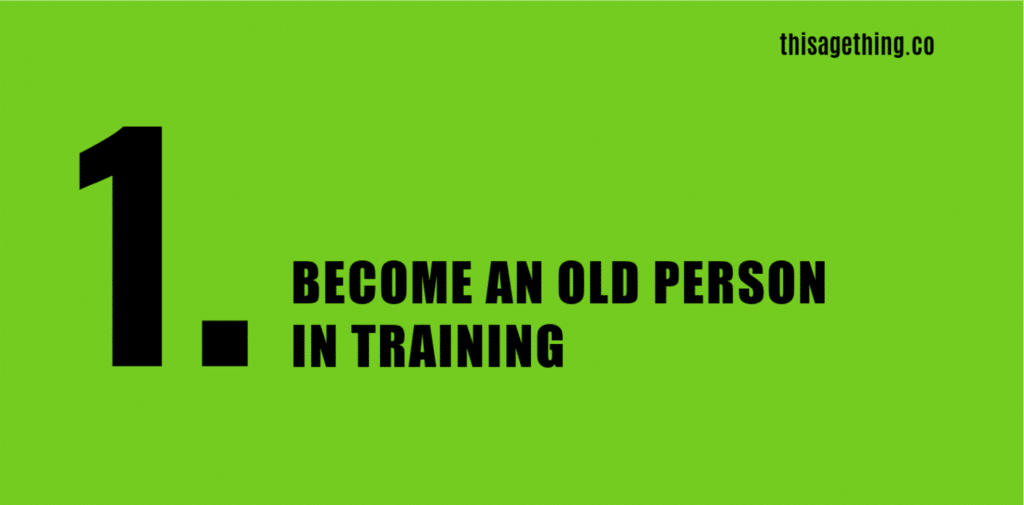
1. Become an Old Person in Training
Here’s a passage from my book about what I mean by this..
In 2008 I heard geriatrician Joanne Lynn describe herself as an old person in training, and I’ve been one ever since. I know I’m not young. I don’t see myself as old. I know a lot of people feel the same way. They’re in the grips of a cruel paradox: they aspire to grow old yet dread the prospect. They spend a lot of energy sustaining the illusion that the old are somehow not us. Becoming an Old Person in Training bridges the us/them divide, and loosens the grip of that exhausting illusion.
Becoming an Old Person in Training acknowledges the inevitability of oldness while relegating it to the future, albeit at an ever-smaller remove. It swaps purpose and intent for dread and denial. It connects us empathically with our future selves. In a world increasingly segregated by race and class as well as by age, reaching over those divisions to acknowledge the one path we all will travel is a radical act.
Becoming an Old Person in Training means ditching preconceptions, looking at and listening carefully to the olders around us, and re-envisioning our place among them. It means looking at older people instead of past them, remembering they were once our age, seeing resilience alongside infirmity, allowing for sensuality, enlarging our notion of beauty, and acknowledging that an apartment or a room or even just a bed can be home to an internal world as rich as ours and very possibly richer. It means thoughtful peeks through the periscope of an open mind at the terrain we will someday inhabit.
“Insist on being seen and valued as our full, rich, lumpy, complicated selves, and take that change out into the world.”
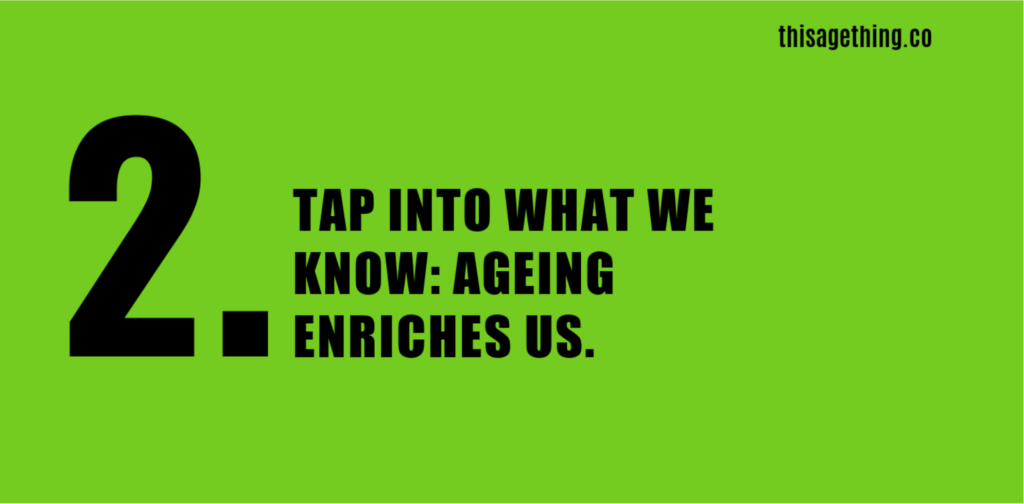
2. Tap into what we know: aging enriches us
Growing older isn’t just different from what we’ve been brainwashed to believe, it’s way better. It’s not that the losses aren’t real, but aging brings authenticity, confidence, perspective, self-awareness. Priorities are clearer. We want less. It’s easier to manage emotions. We care less about what people think, which is really liberating. That’s why I’ve never met anyone who actually wants to go back to their youth—no swapping out just the battered bits— because our years are what make us us.
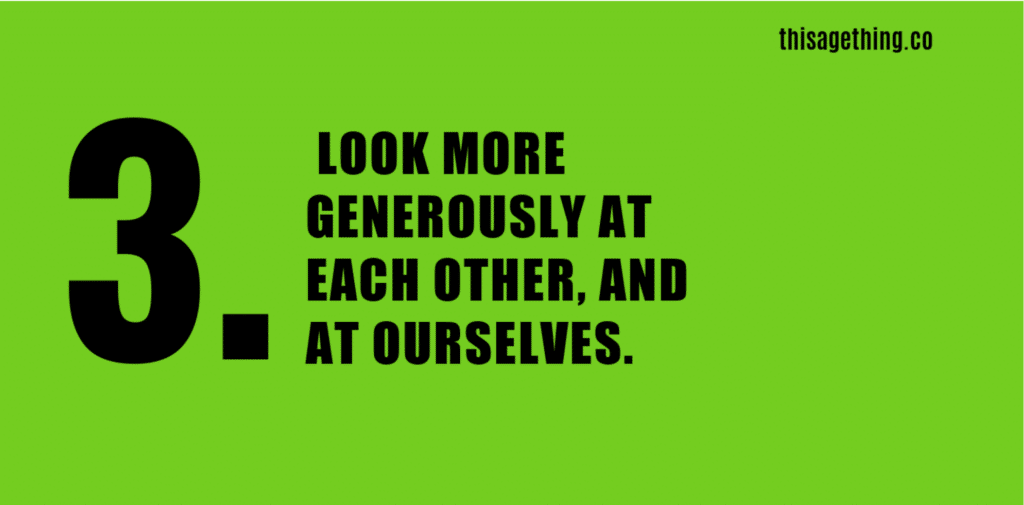
3. Look more generously at each other, and at ourselves
Entire industries are built on convincing people that my face and body are hideous, that old=ugly, especially for women. A system designed to exploit our insecurities can only do so if we agree to it. Instead of muttering, “What the hell happened?” at the face in the mirror, how about taking a minute to recall some of the things that did happen, and how remarkable they were? Let’s not delude ourselves: this is the work of a lifetime. We need to embark on it with others, and across generations. But none of this stigma is “natural,” none of it is fixed, and change is underway. A few years ago, for example, Allure magazine banned the term “anti-aging” from its pages, commending instead “the long-awaited, utterly necessary celebration of growing into your own skin — wrinkles and all.” If this mainstay of the beauty industry can do it, so can we: insist on being seen and valued as our full, rich, lumpy, complicated selves, and take that change out into the world.

4. Make friends of all ages
The most important component of a happy old age isn’t health or wealth. It’s having a solid social network. Networks tend to shrink over time, as we leave the workplace and lose people we’ve known all our lives. That’s why it’s essential to make friends of all ages, and hang onto them. If you don’t know people much older or younger than you, seek them out. Think of something you like to do— concert-going, or playing poker, or knitting (guys knit now!)—and find a mixed-age group to do it with. Don’t stay home just because you’ll stick out.
That’s how desegregation happens. People with the most at stake—olders, in this case – step up and step out. They stop conforming. The open-minded welcome us, and incremental social change takes place. Youngers benefit too. Otherwise each generation has to figure out on its own how dumb and destructive it is to fear growing older, and how much of our youth we squander on worrying about it. Having friends of all ages makes it easier to step off the hamster wheel of age denial, to become old people in training, to share power, and think and act in pro-aging ways.
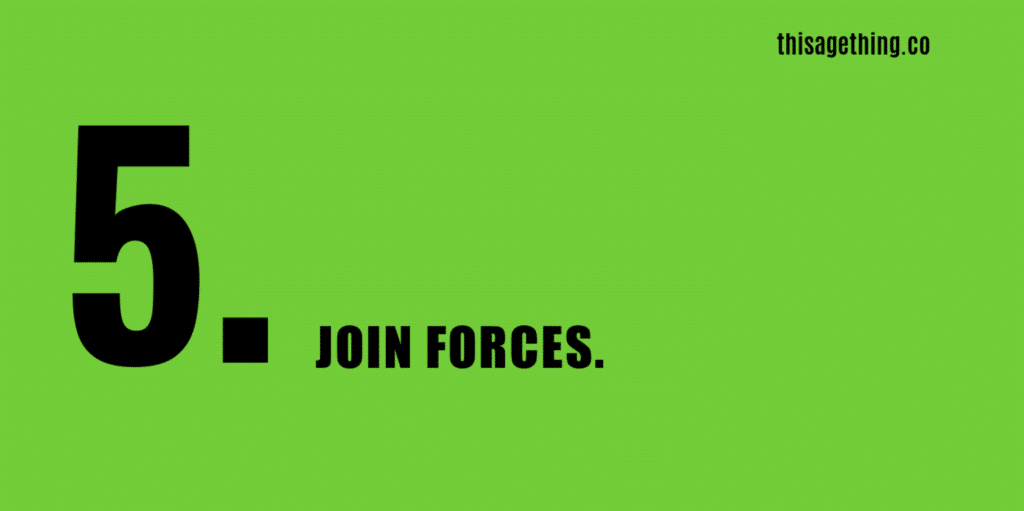
5. Join forces
Dismantling ageism will require nothing less than a mass movement, like the 20thcentury movement that catalyzed a mass shift of consciousness for women around the world. Women came together, shared their stories, and realized that what they’d been thinking of as “personal problems”—like not getting heard or getting harrassed—were actually widely shared political problems that required collective action. There’s a term for that shift in awareness—“cognitive liberation”—which I love because it speaks to both the nerd and the activist in me—as we become aware of discrimination, stop accepting second-class status as “just the way it is,” and realize that we can come together and do something about it. Cognitive liberation is a fantastic feeling, and it is the linchpin of movement-building. For evidence that a global anti-ageism movement is underway, and to find your tribe, check out the Old School Anti-Ageism Clearinghouse.
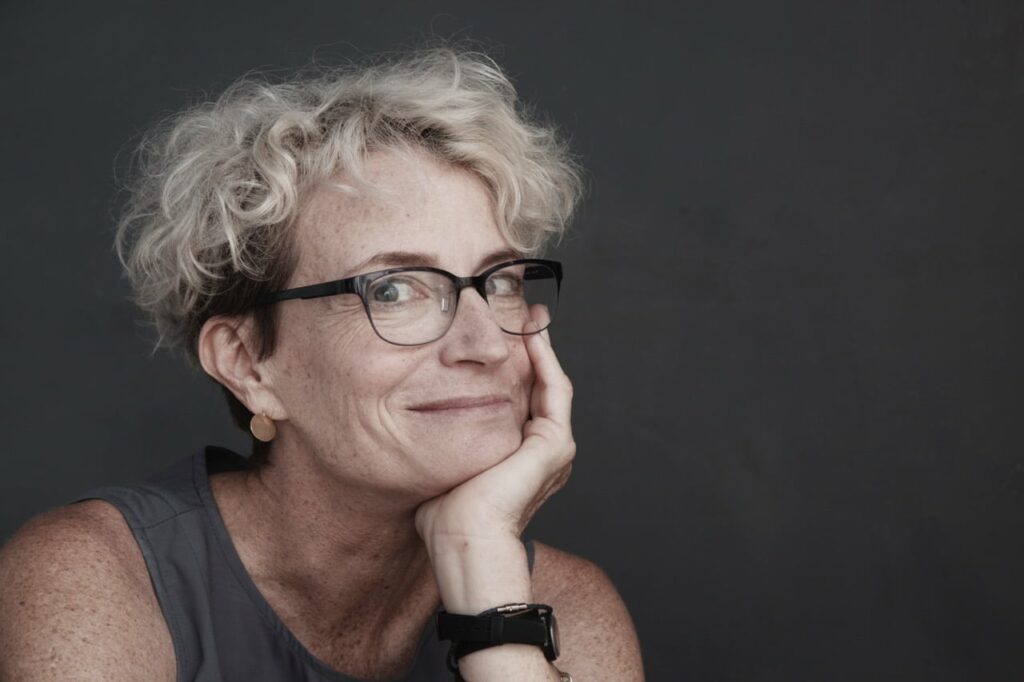
More Information
Ashton Applewhite is a leading voice in the movement dedicated to dismantling ageism and celebrating age as a vibrant and necessary aspect of diversity. The author of This Chair Rocks: A Manifesto Against Ageism and a TED mainstage speaker, she reveals the untapped possibilities of late life
—in our communities, at work, and in ourselves. She is the author of the brilliant Yo! Is this ageist? blog. And co-founder of Old School Anti-Ageism Clearinghouse a treasure chest of inspiration on books, films, campaigns to help us shatter ageism.
We want to hear from you
This story has been categorised as:
Ageism